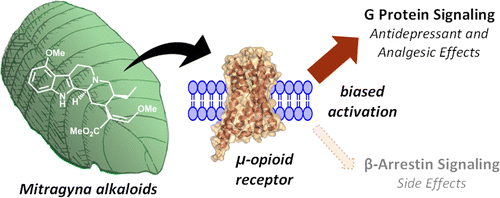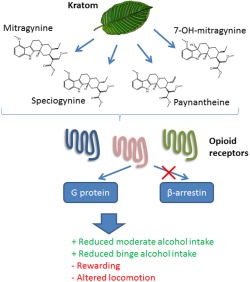The alkaloid speciogynine may be a starting point for low-risk treatment
Self-reports of kratom use as an alcohol substitute exist online, though they have not been as well documented in the scientific literature as other motivations for kratom use, such as substitution for opiates (Smith et al, 2023). In one survey of US residents, 18% of current users and 11.5% of past users reported they used kratom “To cut down or quit using alcohol” (Coe et al, 2019).
This motivation has also been documented among Southeast Asian users who are more likely to engage in the centuries-old traditional practice of chewing fresh kratom leaf or preparing it as a tea (vs. eating dried powder and using extracts, more common in the West). A qualitative study of 34 Thai kratom users found:
Almost all regular krathom users did not drink alcohol although some used to drink it before being krathom chewers. Krathom was believed to be an aid to those who wanted to stop drinking. An ex-drinker explained:
“After I use krathom, I can’t stand the alcohol strong smell. If I drink even a bit, I would have an extreme headache and vomit, get sick and have a hangover. I cannot work and have to take a rest.”
The study also explained that kratom use in this region of Thailand was more socially acceptable than the use of alcohol, tobacco, or cannabis, in part because of better social functioning of people who use kratom over other drugs (Saingham et al, 2013). This implies a social motivation for someone to choose kratom over alcohol.
In another study of 260 kratom users in Malaysia, 39% reported using alcohol prior to kratom initiation, while just 8% reported using alcohol after kratom initiation (Saref et al, 2020).
In our 255 page report of first-hand kratom consumer experiences from comments posted to KratomScience.com, 38 unsolicited comments credited kratom as a tool to help quit or reduce alcohol use and to cut down on cravings.
“I am an alcoholic – always will be. I’ve been sober for more than two years now. I am also bipolar (diagnosed and treated). I use kratom daily. It helps alleviate my desire to drink. Over time, I learned that my drinking correlated to my level of depression. For me, kratom is a mood enhancer and significantly relieves my depression.” – Babs, 2016
“struggled with alcohol and drugs for 40 yrs. Kratom works wonders.. no cravings. Saved mu life” – Russell, 2017
“I was recently binge drinking for 5 years heavily. Everyday every minute every second. I went through the shakes depression nausea irritability shakiness. I even got pancreatitis. It was so difficult to quit and it still is. Alcohol is worse than heroin you can actually die from the withdrawal. I’m not a doctor but 2mg of Klonopin 600mg of gabapentin changed my life forever and some weed here and there. Also kratom has helped me out so much I don’t crave alcohol feel energized and happy.” – Pavel, 2019
“I used red Maeng Da for alcohol cravings, and had absolutely none. It wasn’t anything huge, like a drug. Maybe slightly relaxing, but not like drug-like in any way to me. Still don’t have cravings though, and fell asleep more naturally. kratom can be addictive too, and there is a rebound” – Red, 2019
These self-reported reductions in alcohol use and cravings may have a pharmacological explanation.
Pharmacologists observed in 2016 that kratom alkaloids mitragynine (MTG) and 7-hydroxymitragynine (7HMG) “are G-protein-biased agonists of the mu-opioid receptor, which do not recruit β-arrestin following receptor activation”, noting that “some evidence indicates that MOR agonists biased toward G protein signaling over β-arrestin signaling display less respiratory depression, tolerance development, and constipation, while remaining potent analgesics” (Kruegel et al, 2016).

A 2018 study in mice found that, particularly at the delta opioid receptor (DOR), “G-protein biased agonists may be a potential strategy to decrease voluntary alcohol consumption and β-arrestin recruitment is to be avoided” (Robins et al, 2019).

In 2020, a team from Purdue University* found “Self‐medication of alcohol use disorder with kratom is possible but not without risks”, citing rewarding behaviors (indicative of a dependency risk) and altered locomotion (indicative of seizure or “wobbles” risk) in mice (Gutridge et al, 2020). However, in 2021, the same team from Purdue found that the isolated kratom alkaloid speciogynine was less active at the MOR than MTG and 7HMG, thus possibly presenting a lower dependency risk if isolated (Gutridge et al, 2021).
Researcher Richard Van Rijn, part of the Purdue team, told to Purdue.edu’s Research Foundation News about the possibility that speciogynine could be developed into an effective alcoholism treatment drug.
“We can synthesize a derivative of the natural-occurring kratom alkaloid speciogynine, which has superior potency to reduce alcohol intake,” Van Rijn said. “We used mouse models of alcohol use and assessment of adverse effects, including monitoring for seizures or hyperactivity. Our synthesized compound does not display adverse effects observed with other kratom alkaloids, including abuse potential, hyperactivity and seizures. As such, this molecule may have utility in humans in treating alcohol use disorder.”
(Martin, 2022)
An Alternative to a High-Cost Pharmaceutical
Drug development takes several years and millions of dollars from lab tests to human clinical trials to approval by the Food and Drug Administration (FDA).
Plant alkaloids cannot be patented as they occur naturally. Compounds must be manipulated to create a synthetic drug. For example, pharma company Kures, Inc. has been developing a synthetic drug based on mitragyinine by adding a deuterium molecule, naming the new synthetic compound KUR-101.
However, plants can be selectively bred to grow desirable compounds. A speciogynine-heavy kratom strain could be bred specifically for people who want to self-treat alcohol cravings (should the research bare out) with a lower risk of dependency than traditional kratom. A speciogynine extract could also be available and sold as a dietary supplement. Both of these options would likely carry a lower price than a speciogynine-based FDA approved synthetic drug.
Ideally, FDA would secure enough resources from Congress to enforce Good Manufacturing Practices regulation on all plant medicine and extracts. Instructions for dosage and other information would be provided to consumers. Consumers would have the freedom to grow kratom in their own homes for personal use.
But creating adequate regulation and enforcement of a plant medicine system would take a tremendous amount of political will that may or may not be present given the powerful interests already in place.
More on that coming soon… (link will be pasted here)
References
- Coe, M. A., Pillitteri, J. L., Sembower, M. A., Gerlach, K. K., & Henningfield, J. E. (2019). Kratom as a substitute for opioids: Results from an online survey. Drug and alcohol dependence, 202, 24–32. https://doi.org/10.1016/j.drugalcdep.2019.05.005
- Gutridge, A. M., Chakraborty, S., Varga, B. R., Rhoda, E. S., French, A. R., Blaine, A. T., Royer, Q. H., Cui, H., Yuan, J., Cassell, R. J., Szabó, M., Majumdar, S., & van Rijn, R. M. (2021). Evaluation of Kratom Opioid Derivatives as Potential Treatment Option for Alcohol Use Disorder. Frontiers in pharmacology, 12, 764885. https://doi.org/10.3389/fphar.2021.764885
- Gutridge, A. M., Robins, M. T., Cassell, R. J., Uprety, R., Mores, K. L., Ko, M. J., Pasternak, G. W., Majumdar, S., & van Rijn, R. M. (2020). G protein-biased kratom-alkaloids and synthetic carfentanil-amide opioids as potential treatments for alcohol use disorder. British journal of pharmacology, 177(7), 1497–1513. https://doi.org/10.1111/bph.14913
- Kruegel, A. C., Gassaway, M. M., Kapoor, A., Váradi, A., Majumdar, S., Filizola, M., Javitch, J. A., & Sames, D. (2016). Synthetic and Receptor Signaling Explorations of the Mitragyna Alkaloids: Mitragynine as an Atypical Molecular Framework for Opioid Receptor Modulators. Journal of the American Chemical Society, 138(21), 6754–6764. https://doi.org/10.1021/jacs.6b00360
- Martin, S. (2022, March 3). New plant-based compounds have been created to treat alcohol use disorder. Purdue University Research Foundation News. https://www.purdue.edu/newsroom/releases/2022/Q1/new-plant-based-compounds-have-been-created-to-treat-alcohol-use-disorder.html
- Saingam, D., Assanangkornchai, S., Geater, A. F., & Balthip, Q. (2013). Pattern and consequences of krathom (Mitragyna speciosa Korth.) use among male villagers in southern Thailand: a qualitative study. The International journal on drug policy, 24(4), 351–358. https://doi.org/10.1016/j.drugpo.2012.09.004
- Robins, M. T., Chiang, T., Mores, K. L., Alongkronrusmee, D., & van Rijn, R. M. (2018). Critical Role for Gi/o-Protein Activity in the Dorsal Striatum in the Reduction of Voluntary Alcohol Intake in C57Bl/6 Mice. Frontiers in psychiatry, 9, 112. https://doi.org/10.3389/fpsyt.2018.00112
- Saref, A., Suraya, S., Singh, D., Grundmann, O., Narayanan, S., Swogger, M. T., Prozialeck, W. C., Boyer, E., & Balasingam, V. (2020). Self-Report Data on Regular Consumption of Illicit Drugs and HIV Risk Behaviors after Kratom (Mitragyna Speciosa korth.) Initiation among Illicit Drug Users in Malaysia. Journal of psychoactive drugs, 52(2), 138–144. https://doi.org/10.1080/02791072.2019.1686553
- Smith, K. E., Rogers, J. M., & Feldman, J. D. (2023). Kratom’s Emergence and Persistence Within the US Polydrug Epidemic. Current addiction reports, 10(2), 262–271. https://doi.org/10.1007/s40429-023-00476-5
*Purdue University statement re: Purdue Pharma: “Purdue University is not and has never been affiliated in any way with Purdue Pharma. The pharmaceutical company was founded in Manhattan in 1892 by John Purdue Gray and George Frederick Bingham as the Purdue Frederick Company. Purdue University was founded in 1869 as Indiana’s land-grant institution, named for benefactor John Purdue.”

Love this!
Great, detailed article! Thank you!
Hopeful this helps us get closer to regulation!
After hearing all of the success stories people had using it to help them get off of drugs, I thought I would try it to help break my alcohol addiction. I don’t know if this is just the placebo effect or what but it really worked. I havent had a drop in months and I feel like a completely new person
So glad to hear it has helped you!
I will have to let my parents know about this. This is great!
I never thought about it like this but it makes complete sense!!